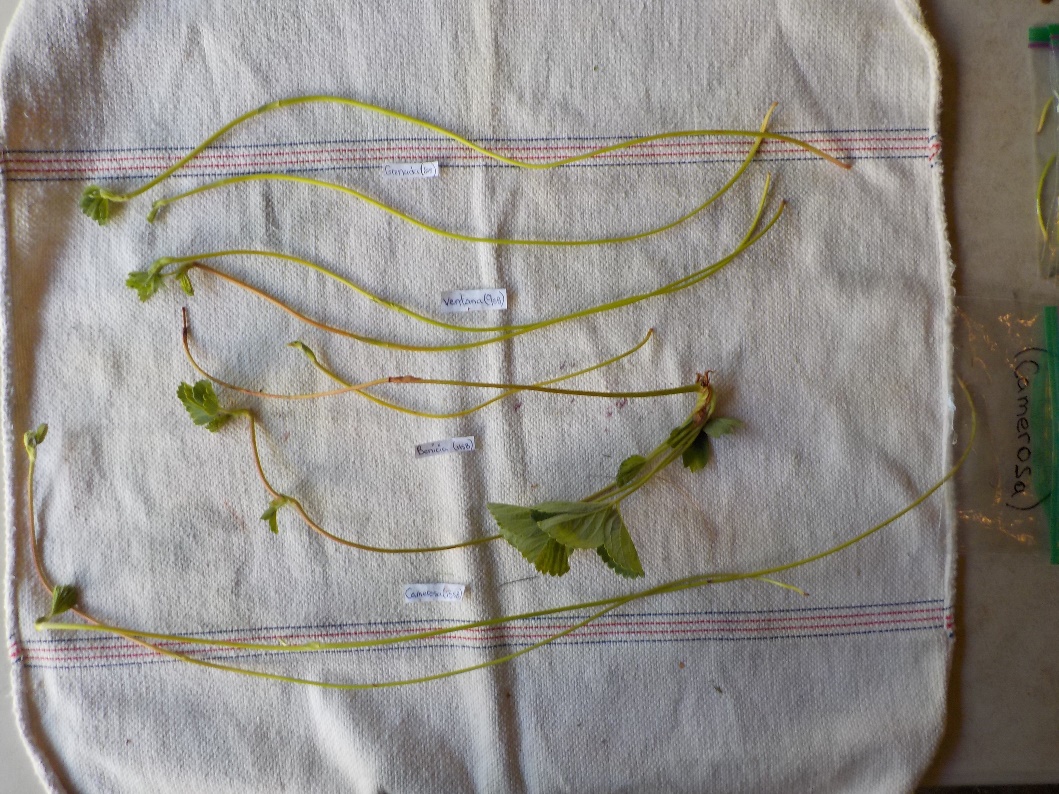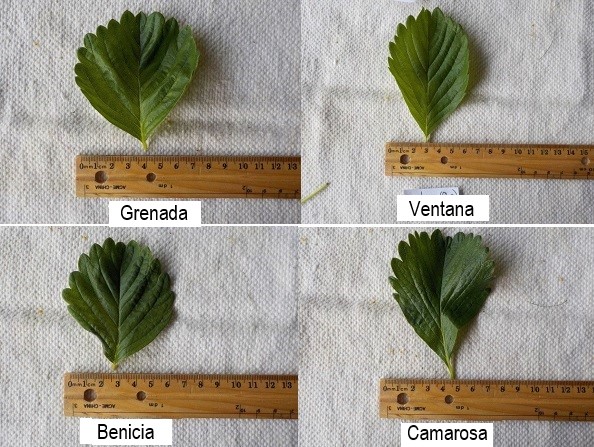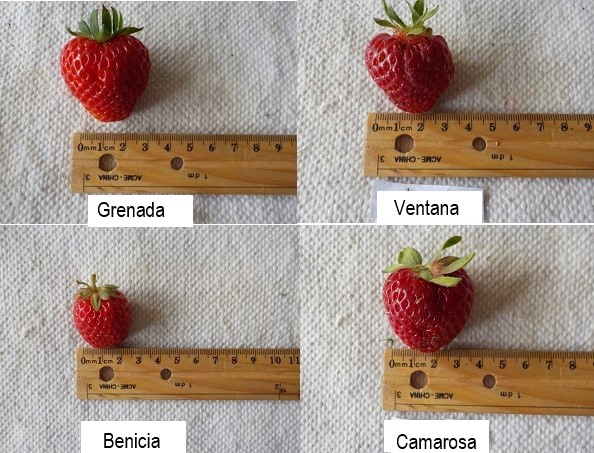Grenada
| Denomination: | 'Grenada' |
|---|---|
| Botanical Name: | Fragaria × ananassa |
| Applicant/Holder: |
The Regents of the University of California 1111 Franklin Street, 12th Floor Oakland, California 94607-5200 United States of America |
| Breeder: |
Kirk D. Larson, Irvine, United States of America Douglas Shaw, Davis, United States of America |
| Agent in Canada: |
Expert Agriculture Team Ltd. 46420 Prairie Central Road Chilliwack, British Columbia V2P 6H3 Canada Tel: 604-795-2537 |
| Application Date: | 2014-02-10 |
| Application Number: | 15-8515 |
| Grant of Rights Date: | 2020-02-26 |
| Certificate Number: | 6154 |
| Grant of Rights Termination Date: | 2040-02-26 |
Variety Description
Varieties used for comparison: 'Ventana', 'Benicia' and 'Camarosa'
Summary: The plants of 'Grenada' have many stolons whereas the plants of 'Ventana' have few to medium number of stolons and 'Benicia' have few stolons. The stolons of 'Grenada' have absent or very weak anthocyanin colouration whereas those of all the reference varieties have strong anthocyanin colouration. The arrangement of the petals for 'Grenada' is overlapping whereas for 'Camarosa' they are free. The calyx of 'Grenada' has strong adherence whereas that of 'Ventana' ranges from weak to medium strength, that of 'Benicia' is weak and that of 'Camarosa' is medium strength. The fruit of 'Grenada' is firm whereas that of 'Ventana' is soft and that of both 'Benicia' and 'Camarosa' are soft to medium firmness. The flesh of the fruit of 'Grenada' is orange red whereas that of 'Ventana' is medium red and that of 'Benicia' is dark red. The core of the fruit of 'Grenada' is white whereas that of both 'Ventana' and 'Benicia' are medium red.
Description:
PLANT: partially remontant bearing type, upright growth habit, medium to dense foliage, medium vigour
STOLONS: many, absent or very weak intensity of anthocyanin colouration
PETIOLE: short to medium length, horizontal attitude of hairs
LEAF: small to medium, medium green on upper side, degree of blistering ranging from absent or weak to medium, medium degree of glossiness, no variegation
TERMINAL LEAFLET: moderately longer than wide, acute base, serrate and crenate margin, straight in cross-section
TIME OF BEGINNING OF FLOWERING: early season
INFLORESCENCE: positioned at same level as the foliage, few to few to medium number of flowers
PEDICEL: slightly outwards attitude of hairs
FLOWER: calyx same size as corolla, stamens present
PETALS: overlapping arrangement, length is equal to width, white on inner side
CALYX: attachment is level with surface of fruit, upwards attitude of sepals, same diameter as fruit, strong adherence to fruit
FRUIT: equally as long as wide, small to medium sized, conical, slight difference in shape of fruit from first crop compared to second crop, absent or very narrow band without achenes
FRUIT SURFACE: medium red, even or very slightly uneven colour distribution, medium to strong degree of glossiness, slightly uneven
ACHENES: positioned from below to level with fruit surface
FRUIT FLESH: firm, orange red with white core, medium sized cavity
TIME OF BEGINNING OF FRUIT RIPENING: early to mid-season
Origin & Breeding History: 'Grenada' originated from the controlled cross between two unreleased germplasm accessions, Cal 4.41-6 and Cal 5.109-2 conducted in 2008 at the South Coast Research and Extension Center, Irvine, California, USA. The progeny initially designated as Cal 8.55-2 was asexually propagated by stolons in 2009 near Winters, California. The variety tested under the designation 'C232' was selected based on productivity, fruit size, commercial appearance, flowering type (short day vs. day-neutral), plant architecture and its reaction to diseases, such as powdery mildew. Further testing was done at facilities in Watsonville, California and to a limited extent in grower fields starting in 2010.
Tests & Trials: The comparative trial for 'Grenada' was grown by the Expert Agriculture Team Ltd., in Chilliwack, British Columbia during the 2018 growing seasons. The trial was planted in the spring of 2017 in a randomized complete block design. Each variety consisted of 3 replicates with 10 plants per replicate for a total of 30 plants of each variety. Plants were spaced approximately 30 centimeters apart in two offset rows approximately 60 meters long. Measurements were taken from 10 plants or parts of plants of each variety.
Click on image for larger view

Strawberry: 'Grenada' (top) with reference varieties 'Ventana' (centre top), 'Benicia' (centre bottom) and 'Camarosa' (bottom)
Click on image for larger view

Strawberry: 'Grenada' (top left) with reference varieties 'Ventana' (top right), 'Benicia' (bottom left) and 'Camarosa' (bottom right)
Click on image for larger view

Strawberry: 'Grenada' (top left) with reference varieties 'Ventana' (top right), 'Benicia' (bottom left) and 'Camarosa' (bottom right)
- Date modified: